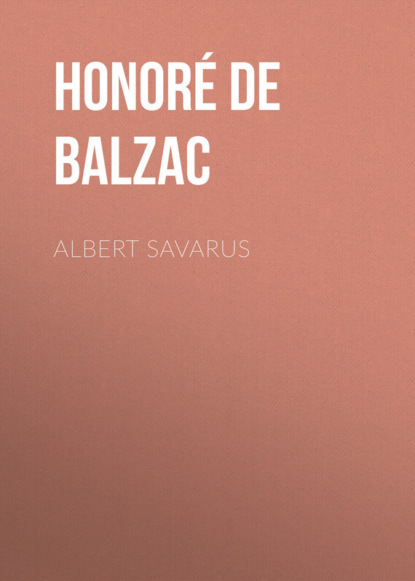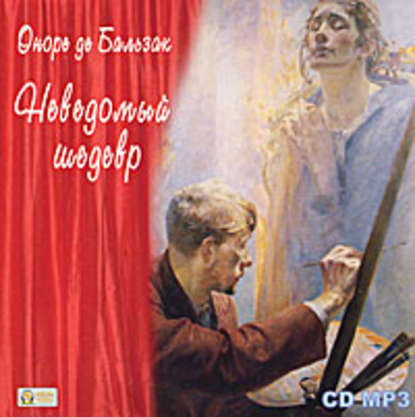
Полная версия
Albert Savarus
This education, and her own modest demeanor, hid in Rosalie a spirit of iron. Physiologists and profound observers will tell you, perhaps to your astonishment, that tempers, characteristics, wit, or genius reappear in families at long intervals, precisely like what are known as hereditary diseases. Thus talent, like the gout, sometimes skips over two generations. We have an illustrious example of this phenomenon in George Sand, in whom are resuscitated the force, the power, and the imaginative faculty of the Marechal de Saxe, whose natural granddaughter she is.
The decisive character and romantic daring of the famous Watteville had reappeared in the soul of his grand-niece, reinforced by the tenacity and pride of blood of the Rupts. But these qualities – or faults, if you will have it so – were as deeply buried in this young girlish soul, apparently so weak and yielding, as the seething lavas within a hill before it becomes a volcano. Madame de Watteville alone, perhaps, suspected this inheritance from two strains. She was so severe to her Rosalie, that she replied one day to the Archbishop, who blamed her for being too hard on the child, “Leave me to manage her, monseigneur. I know her! She has more than one Beelzebub in her skin!”
The Baroness kept all the keener watch over her daughter, because she considered her honor as a mother to be at stake. After all, she had nothing else to do. Clotilde de Rupt, at this time five-and-thirty, and as good as widowed, with a husband who turned egg-cups in every variety of wood, who set his mind on making wheels with six spokes out of iron-wood, and manufactured snuff-boxes for everyone of his acquaintance, flirted in strict propriety with Amedee de Soulas. When this young man was in the house, she alternately dismissed and recalled her daughter, and tried to detect symptoms of jealousy in that youthful soul, so as to have occasion to repress them. She imitated the police in its dealings with the republicans; but she labored in vain. Rosalie showed no symptoms of rebellion. Then the arid bigot accused her daughter of perfect insensibility. Rosalie knew her mother well enough to be sure that if she had thought young Monsieur de Soulas nice, she would have drawn down on herself a smart reproof. Thus, to all her mother’s incitement she replied merely by such phrases as are wrongly called Jesuitical – wrongly, because the Jesuits were strong, and such reservations are the chevaux de frise behind which weakness takes refuge. Then the mother regarded the girl as a dissembler. If by mischance a spark of the true nature of the Wattevilles and the Rupts blazed out, the mother armed herself with the respect due from children to their parents to reduce Rosalie to passive obedience.
This covert battle was carried on in the most secret seclusion of domestic life, with closed doors. The Vicar-General, the dear Abbe Grancey, the friend of the late Archbishop, clever as he was in his capacity of the chief Father Confessor of the diocese, could not discover whether the struggle had stirred up some hatred between the mother and daughter, whether the mother were jealous in anticipation, or whether the court Amedee was paying to the girl through her mother had not overstepped its due limits. Being a friend of the family, neither mother nor daughter, confessed to him. Rosalie, a little too much harried, morally, about young de Soulas, could not abide him, to use a homely phrase, and when he spoke to her, trying to take her heart by surprise, she received him but coldly. This aversion, discerned only by her mother’s eyes, was a constant subject of admonition.
“Rosalie, I cannot imagine why you affect such coldness towards Amedee. Is it because he is a friend of the family, and because we like him – your father and I?”
“Well, mamma,” replied the poor child one day, “if I made him welcome, should I not be still more in the wrong?”
“What do you mean by that?” cried Madame de Watteville. “What is the meaning of such words? Your mother is unjust, no doubt, and according to you, would be so in any case! Never let such an answer pass your lips again to your mother – ” and so forth.
This quarrel lasted three hours and three-quarters. Rosalie noted the time. Her mother, pale with fury, sent her to her room, where Rosalie pondered on the meaning of this scene without discovering it, so guileless was she. Thus young Monsieur de Soulas, who was supposed by every one to be very near the end he was aiming at, all neckcloths set, and by dint of pots of patent blacking – an end which required so much waxing of his moustaches, so many smart waistcoats, wore out so many horseshoes and stays – for he wore a leather vest, the stays of the lion– Amedee, I say, was further away than any chance comer, although he had on his side the worthy and noble Abbe de Grancey.
“Madame,” said Monsieur de Soulas, addressing the Baroness, while waiting till his soup was cool enough to swallow, and affecting to give a romantic turn to his narrative, “one fine morning the mail coach dropped at the Hotel National a gentleman from Paris, who, after seeking apartments, made up his mind in favor of the first floor in Mademoiselle Galard’s house, Rue du Perron. Then the stranger went straight to the Mairie, and had himself registered as a resident with all political qualifications. Finally, he had his name entered on the list of the barristers to the Court, showing his title in due form, and he left his card on all his new colleagues, the Ministerial officials, the Councillors of the Court, and the members of the bench, with the name, ‘ALBERT SAVARON.’”
“The name of Savaron is famous,” said Mademoiselle de Watteville, who was strong in heraldic information. “The Savarons of Savarus are one of the oldest, noblest, and richest families in Belgium.”
“He is a Frenchman, and no man’s son,” replied Amedee de Soulas. “If he wishes to bear the arms of the Savarons of Savarus, he must add a bar-sinister. There is no one left of the Brabant family but a Mademoiselle de Savarus, a rich heiress, and unmarried.”
“The bar-sinister is, of course, the badge of a bastard; but the bastard of a Comte de Savarus is noble,” answered Rosalie.
“Enough, that will do, mademoiselle!” said the Baroness.
“You insisted on her learning heraldry,” said Monsieur de Watteville, “and she knows it very well.”
“Go on, I beg, Monsieur de Soulas.”
“You may suppose that in a town where everything is classified, known, pigeon-holed, ticketed, and numbered, as in Besancon, Albert Savaron was received without hesitation by the lawyers of the town. They were satisfied to say, ‘Here is a man who does not know his Besancon. Who the devil can have sent him here? What can he hope to do? Sending his card to the Judges instead of calling in person! What a blunder!’ And so, three days after, Savaron had ceased to exist. He took as his servant old Monsieur Galard’s man – Galard being dead – Jerome, who can cook a little. Albert Savaron was all the more completely forgotten, because no one had seen him or met him anywhere.”
“Then, does he not go to mass?” asked Madame de Chavoncourt.
“He goes on Sundays to Saint-Pierre, but to the early service at eight in the morning. He rises every night between one and two in the morning, works till eight, has his breakfast, and then goes on working. He walks in his garden, going round fifty, or perhaps sixty times; then he goes in, dines, and goes to bed between six and seven.”
“How did you learn all that?” Madame de Chavoncourt asked Monsieur de Soulas.
“In the first place, madame, I live in the Rue Neuve, at the corner of the Rue du Perron; I look out on the house where this mysterious personage lodges; then, of course, there are communications between my tiger and Jerome.”
“And you gossip with Babylas?”
“What would you have me do out riding?”
“Well – and how was it that you engaged a stranger for your defence?” asked the Baroness, thus placing the conversation in the hands of the Vicar-General.
“The President of the Court played this pleader a trick by appointing him to defend at the Assizes a half-witted peasant accused of forgery. But Monsieur Savaron procured the poor man’s acquittal by proving his innocence and showing that he had been a tool in the hands of the real culprits. Not only did his line of defence succeed, but it led to the arrest of two of the witnesses, who were proved guilty and condemned. His speech struck the Court and the jury. One of these, a merchant, placed a difficult case next day in the hands of Monsieur Savaron, and he won it. In the position in which we found ourselves, Monsieur Berryer finding it impossible to come to Besancon, Monsieur de Garcenault advised him to employ this Monsieur Albert Savaron, foretelling our success. As soon as I saw him and heard him, I felt faith in him, and I was not wrong.”
“Is he then so extraordinary?” asked Madame de Chavoncourt.
“Certainly, madame,” replied the Vicar-General.
“Well, tell us about it,” said Madame de Watteville.
“The first time I saw him,” said the Abbe de Grancey, “he received me in his outer room next the ante-room – old Galard’s drawing-room – which he has had painted like old oak, and which I found entirely lined with law-books, arranged on shelves also painted as old oak. The painting and the books are the sole decoration of the room, for the furniture consists of an old writing table of carved wood, six old armchairs covered with tapestry, window curtains of gray stuff bordered with green, and a green carpet over the floor. The ante-room stove heats this library as well. As I waited there I did not picture my advocate as a young man. But this singular setting is in perfect harmony with his person; for Monsieur Savaron came out in a black merino dressing-gown tied with a red cord, red slippers, a red flannel waistcoat, and a red smoking-cap.”
“The devil’s colors!” exclaimed Madame de Watteville.
“Yes,” said the Abbe; “but a magnificent head. Black hair already streaked with a little gray, hair like that of Saint Peter and Saint Paul in pictures, with thick shining curls, hair as stiff as horse-hair; a round white throat like a woman’s; a splendid forehead, furrowed by the strong median line which great schemes, great thoughts, deep meditations stamp on a great man’s brow; an olive complexion marbled with red, a square nose, eyes of flame, hollow cheeks, with two long lines, betraying much suffering, a mouth with a sardonic smile, and a small chin, narrow, and too short; crow’s feet on his temples; deep-set eyes, moving in their sockets like burning balls; but, in spite of all these indications of a violently passionate nature, his manner was calm, deeply resigned, and his voice of penetrating sweetness, which surprised me in Court by its easy flow; a true orator’s voice, now clear and appealing, sometimes insinuating, but a voice of thunder when needful, and lending itself to sarcasm to become incisive.
“Monsieur Albert Savaron is of middle height, neither stout nor thin. And his hands are those of a prelate.
“The second time I called on him he received me in his bed-room, adjoining the library, and smiled at my astonishment when I saw there a wretched chest of drawers, a shabby carpet, a camp-bed, and cotton window-curtains. He came out of his private room, to which no one is admitted, as Jerome informed me; the man did not go in, but merely knocked at the door.
“The third time he was breakfasting in his library on the most frugal fare; but on this occasion, as he had spent the night studying our documents, as I had my attorney with me, and as that worthy Monsieur Girardet is long-winded, I had leisure to study the stranger. He certainly is no ordinary man. There is more than one secret behind that face, at once so terrible and so gentle, patient and yet impatient, broad and yet hollow. I saw, too, that he stooped a little, like all men who have some heavy burden to bear.”
“Why did so eloquent a man leave Paris? For what purpose did he come to Besancon?” asked pretty Madame de Chavoncourt. “Could no one tell him how little chance a stranger has of succeeding here? The good folks of Besancon will make use of him, but they will not allow him to make use of them. Why, having come, did he make so little effort that it needed a freak of the President’s to bring him forward?”
“After carefully studying that fine head,” said the Abbe, looking keenly at the lady who had interrupted him, in such a way as to suggest that there was something he would not tell, “and especially after hearing him this morning reply to one of the bigwigs of the Paris Bar, I believe that this man, who may be five-and-thirty, will by and by make a great sensation.”
“Why should we discuss him? You have gained your action, and paid him,” said Madame de Watteville, watching her daughter, who, all the time the Vicar-General had been speaking, seemed to hang on his lips.
The conversation changed, and no more was heard of Albert Savaron.
The portrait sketched by the cleverest of the Vicars-General of the diocese had all the greater charm for Rosalie because there was a romance behind it. For the first time in her life she had come across the marvelous, the exceptional, which smiles on every youthful imagination, and which curiosity, so eager at Rosalie’s age, goes forth to meet half-way. What an ideal being was this Albert – gloomy, unhappy, eloquent, laborious, as compared by Mademoiselle de Watteville to that chubby fat Count, bursting with health, paying compliments, and talking of the fashions in the very face of the splendor of the old counts of Rupt. Amedee had cost her many quarrels and scoldings, and, indeed, she knew him only too well; while this Albert Savaron offered many enigmas to be solved.
“Albert Savaron de Savarus,” she repeated to herself.
Now, to see him, to catch sight of him! This was the desire of the girl to whom desire was hitherto unknown. She pondered in her heart, in her fancy, in her brain, the least phrases used by the Abbe de Grancey, for all his words had told.
“A fine forehead!” said she to herself, looking at the head of every man seated at the table; “I do not see one fine one. – Monsieur de Soulas’ is too prominent; Monsieur de Grancey’s is fine, but he is seventy, and has no hair, it is impossible to see where his forehead ends.”
“What is the matter, Rosalie; you are eating nothing?”
“I am not hungry, mamma,” said she. “A prelate’s hands – ” she went on to herself. “I cannot remember our handsome Archbishop’s hands, though he confirmed me.”
Finally, in the midst of her coming and going in the labyrinth of her meditations, she remembered a lighted window she had seen from her bed, gleaming through the trees of the two adjoining gardens, when she had happened to wake in the night… “Then that was his light!” thought she. “I might see him! – I will see him.”
“Monsieur de Grancey, is the Chapter’s lawsuit quite settled?” said Rosalie point-blank to the Vicar-General, during a moment of silence.
Madame de Watteville exchanged rapid glances with the Vicar-General.
“What can that matter to you, my dear child?” she said to Rosalie, with an affected sweetness which made her daughter cautious for the rest of her days.
“It might be carried to the Court of Appeal, but our adversaries will think twice about that,” replied the Abbe.
“I never could have believed that Rosalie would think about a lawsuit all through a dinner,” remarked Madame de Watteville.
“Nor I either,” said Rosalie, in a dreamy way that made every one laugh. “But Monsieur de Grancey was so full of it, that I was interested.”
The company rose from table and returned to the drawing-room. All through the evening Rosalie listened in case Albert Savaron should be mentioned again; but beyond the congratulations offered by each newcomer to the Abbe on having gained his suit, to which no one added any praise of the advocate, no more was said about it. Mademoiselle de Watteville impatiently looked forward to bedtime. She had promised herself to wake at between two and three in the morning, and to look at Albert’s dressing-room windows. When the hour came, she felt almost pleasure in gazing at the glimmer from the lawyer’s candles that shone through the trees, now almost bare of their leaves. By the help of the strong sight of a young girl, which curiosity seems to make longer, she saw Albert writing, and fancied she could distinguish the color of the furniture, which she thought was red. From the chimney above the roof rose a thick column of smoke.
“While all the world is sleeping, he is awake – like God!” thought she.
The education of girls brings with it such serious problems – for the future of a nation is in the mother – that the University of France long since set itself the task of having nothing to do with it. Here is one of these problems: Ought girls to be informed on all points? Ought their minds to be under restraint? It need not be said that the religious system is one of restraint. If you enlighten them, you make them demons before their time; if you keep them from thinking, you end in the sudden explosion so well shown by Moliere in the character of Agnes, and you leave this suppressed mind, so fresh and clear-seeing, as swift and as logical as that of a savage, at the mercy of an accident. This inevitable crisis was brought on in Mademoiselle de Watteville by the portrait which one of the most prudent Abbes of the Chapter of Besancon imprudently allowed himself to sketch at a dinner party.
Next morning, Mademoiselle de Watteville, while dressing, necessarily looked out at Albert Savaron walking in the garden adjoining that of the Hotel de Rupt.
“What would have become of me,” thought she, “if he had lived anywhere else? Here I can, at any rate, see him. – What is he thinking about?”
Having seen this extraordinary man, though at a distance, the only man whose countenance stood forth in contrast with crowds of Besancon faces she had hitherto met with, Rosalie at once jumped at the idea of getting into his house, of ascertaining the reason of so much mystery, of hearing that eloquent voice, of winning a glance from those fine eyes. All this she set her heart on, but how could she achieve it?
All that day she drew her needle through her embroidery with the obtuse concentration of a girl who, like Agnes, seems to be thinking of nothing, but who is reflecting on things in general so deeply, that her artifice is unfailing. As a result of this profound meditation, Rosalie thought she would go to confession. Next morning, after Mass, she had a brief interview with the Abbe Giroud at Saint-Pierre, and managed so ingeniously that the hour of her confession was fixed for Sunday morning at half-past seven, before the eight o’clock Mass. She committed herself to a dozen fibs in order to find herself, just for once, in the church at the hour when the lawyer came to Mass. Then she was seized with an impulse of extreme affection for her father; she went to see him in his workroom, and asked him for all sorts of information on the art of turning, ending by advising him to turn larger pieces, columns. After persuading her father to set to work on some twisted pillars, one of the difficulties of the turner’s art, she suggested that he should make use of a large heap of stones that lay in the middle of the garden to construct a sort of grotto on which he might erect a little temple or Belvedere in which his twisted pillars could be used and shown off to all the world.
At the climax of the pleasure the poor unoccupied man derived from this scheme, Rosalie said, as she kissed him, “Above all, do not tell mamma who gave you the notion; she would scold me.”
“Do not be afraid!” replied Monsieur de Watteville, who groaned as bitterly as his daughter under the tyranny of the terrible descendant of the Rupts.
So Rosalie had a certain prospect of seeing ere long a charming observatory built, whence her eye would command the lawyer’s private room. And there are men for whose sake young girls can carry out such masterstrokes of diplomacy, while, for the most part, like Albert Savaron, they know it not.
The Sunday so impatiently looked for arrived, and Rosalie dressed with such carefulness as made Mariette, the ladies’-maid, smile.
“It is the first time I ever knew mademoiselle to be so fidgety,” said Mariette.
“It strikes me,” said Rosalie, with a glance at Mariette, which brought poppies to her cheeks, “that you too are more particular on some days than on others.”
As she went down the steps, across the courtyard, and through the gates, Rosalie’s heart beat, as everybody’s does in anticipation of a great event. Hitherto, she had never known what it was to walk in the streets; for a moment she had felt as though her mother must read her schemes on her brow, and forbid her going to confession, and she now felt new blood in her feet, she lifted them as though she trod on fire. She had, of course, arranged to be with her confessor at a quarter-past eight, telling her mother eight, so as to have about a quarter of an hour near Albert. She got to church before Mass, and after a short prayer, went to see if the Abbe Giroud were in his confessional, simply to pass the time; and she thus placed herself in such a way as to see Albert as he came into church.
The man must have been atrociously ugly who did not seem handsome to Mademoiselle de Watteville in the frame of mind produced by her curiosity. And Albert Savaron, who was really very striking, made all the more impression on Rosalie because his mien, his walk, his carriage, everything down to his clothing, had the indescribable stamp which can only be expressed by the word Mystery.
He came in. The church, till now gloomy, seemed to Rosalie to be illuminated. The girl was fascinated by his slow and solemn demeanor, as of a man who bears a world on his shoulders and whose deep gaze, whose very gestures, combine to express a devastating or absorbing thought. Rosalie now understood the Vicar-General’s words in their fullest extent. Yes, those eyes of tawny brown, shot with golden lights, covered ardor which revealed itself in sudden flashes. Rosalie, with a recklessness which Mariette noted, stood in the lawyer’s way, so as to exchange glances with him; and this glance turned her blood, for it seethed and boiled as though its warmth were doubled.
As soon as Albert had taken a seat, Mademoiselle de Watteville quickly found a place whence she could see him perfectly during all the time the Abbe might leave her. When Mariette said, “Here is Monsieur Giroud,” it seemed to Rosalie that the interview had lasted no more than a few minutes. By the time she came out from the confessional, Mass was over. Albert had left the church.
“The Vicar-General was right,” thought she. “He is unhappy. Why should this eagle – for he has the eyes of an eagle – swoop down on Besancon? Oh, I must know everything! But how?”
Under the smart of this new desire Rosalie set the stitches of her worsted-work with exquisite precision, and hid her meditations under a little innocent air, which shammed simplicity to deceive Madame de Watteville.
From that Sunday, when Mademoiselle de Watteville had met that look, or, if you please, received this baptism of fire – a fine expression of Napoleon’s which may be well applied to love – she eagerly promoted the plan for the Belvedere.
“Mamma,” said she one day when two columns were turned, “my father has taken a singular idea into his head; he is turning columns for a Belvedere he intends to erect on the heap of stones in the middle of the garden. Do you approve of it? It seems to me – ”
“I approve of everything your father does,” said Madame de Watteville drily, “and it is a wife’s duty to submit to her husband even if she does not approve of his ideas. Why should I object to a thing which is of no importance in itself, if only it amuses Monsieur de Watteville?”
“Well, because from thence we shall see into Monsieur de Soulas’ rooms, and Monsieur de Soulas will see us when we are there. Perhaps remarks may be made – ”
“Do you presume, Rosalie, to guide your parents, and think you know more than they do of life and the proprieties?”
“I say no more, mamma. Besides, my father said that there would be a room in the grotto, where it would be cool, and where we can take coffee.”
“Your father has had an excellent idea,” said Madame de Watteville, who forthwith went to look at the columns.
She gave her entire approbation to the Baron de Watteville’s design, while choosing for the erection of this monument a spot at the bottom of the garden, which could not be seen from Monsieur de Soulas’ windows, but whence they could perfectly see into Albert Savaron’s rooms. A builder was sent for, who undertook to construct a grotto, of which the top should be reached by a path three feet wide through the rock-work, where periwinkles would grow, iris, clematis, ivy, honeysuckle, and Virginia creeper. The Baroness desired that the inside should be lined with rustic wood-work, such as was then the fashion for flower-stands, with a looking-glass against the wall, an ottoman forming a box, and a table of inlaid bark. Monsieur de Soulas proposed that the floor should be of asphalt. Rosalie suggested a hanging chandelier of rustic wood.












